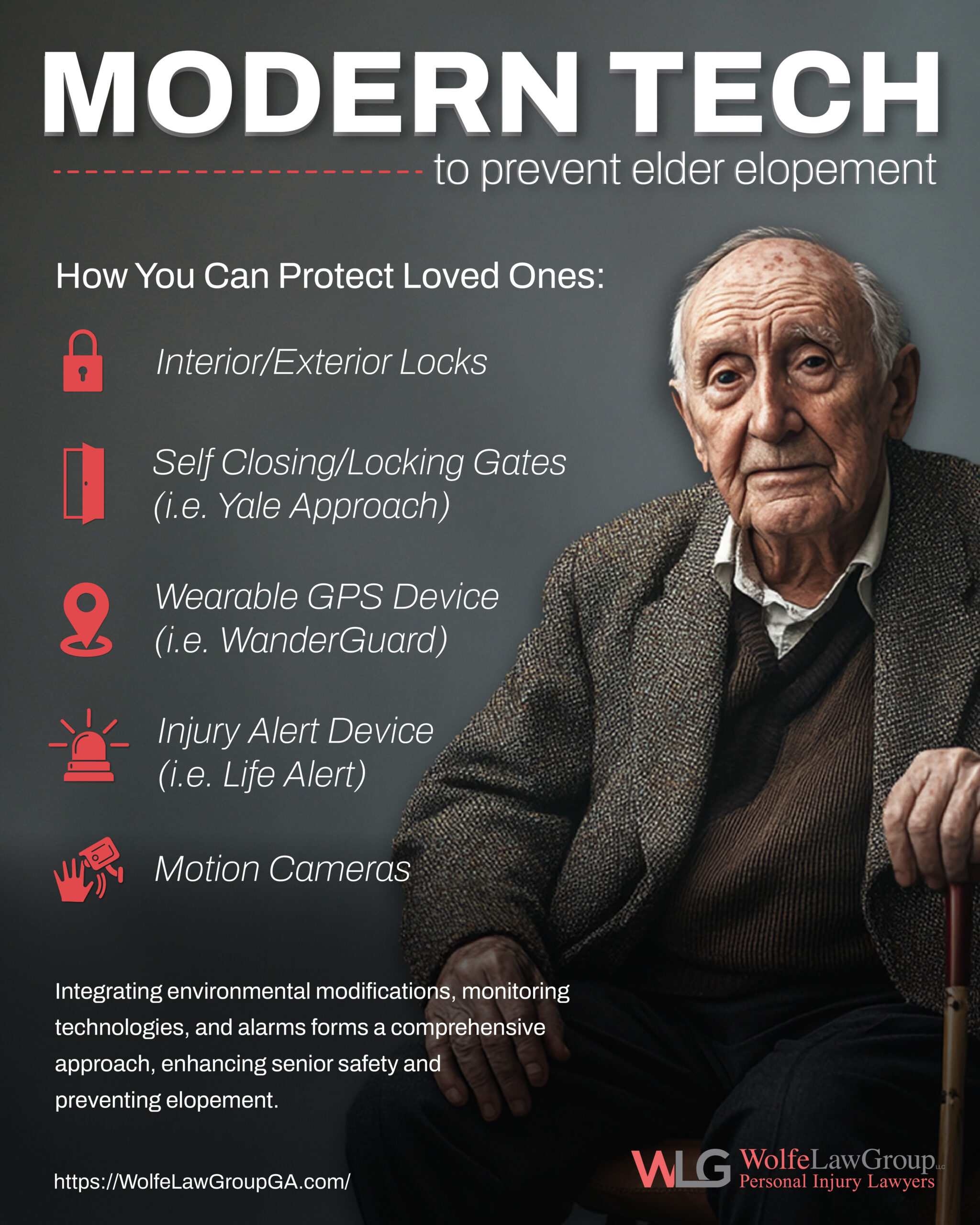Key Takeaways
- Elopement risk in nursing homes refers to residents leaving unsupervised and is influenced by factors like cognitive impairment and inadequate supervision.
- Differentiating elopement from wandering is essential, as both behaviors require tailored interventions to enhance resident safety.
- Effective prevention strategies include adequate staffing, secure environments, individualized care plans, and the use of monitoring technology.
Defining Elopement Risk in Nursing Homes
Elopement in a nursing home context refers to residents leaving the facility unsupervised, which can lead to severe consequences such as dehydration, injury, or death. The term “elopement risk” indicates the potential danger of a resident leaving a healthcare facility without authorization. This risk is heightened by factors such as misunderstandings about tasks, chaotic environments, and specific health conditions that increase the likelihood of nursing home elopement. Recognizing these factors aids in implementing effective preventative measures.
Common causes of elopement include inadequate supervision and the effects of certain medications. Knowing these contributing factors allows healthcare providers to anticipate and mitigate risks. Understanding why elopement occurs allows nursing homes to tailor their safety protocols more effectively. This comprehensive approach not only enhances resident safety but also ensures peace of mind for their families.
Hurt? Your Search for Justice Ends Here. Let’s Get Started, for FREE.
Get your FREE and confidential case review today.
Differentiating Elopement from Wandering
While elopement involves a resident leaving the facility unnoticed, wandering refers to moving around within the facility. Both behaviors can result in significant emotional trauma and physical harm. Distinguishing between these behaviors helps nursing home staff implement appropriate interventions.
Risk increases as cognitive impairment becomes more severe, leading to an increased risk of dangerous behavior. A history of wandering suggests a likelihood of repetition, necessitating close monitoring and strategies to prevent both dangerous behavior.
Common Causes of Wandering Behavior
Wandering behavior in nursing home residents can stem from various factors, including mental impairment, confusion, and curiosity. Conditions such as Alzheimer’s disease and dementia significantly contribute to wandering behavior. Restlessness, feeling confined, or unmet needs like hunger or thirst can also lead to wandering, affecting wandering residents.
Anxiety and agitation are significant triggers that can cause both elopement and wandering behaviors in seniors. Understanding the motivations behind wandering can assist nursing home staff in developing effective care plans that address these triggers, thereby reducing the risk of elopement.
Identifying High-Risk Residents
Identifying high-risk residents is crucial for preventing elopement. Patients with conditions such as Alzheimer’s disease are at a significantly higher risk for wandering or elopement. Wandering behavior is especially prevalent among dementia residents in nursing homes, with estimates suggesting 60% may wander. Approximately 13-24% of older adults may experience elopement, with a higher occurrence among Alzheimer’s disease patients.
Certain behaviors, like restlessness and agitation, can indicate a higher risk of elopement. Individuals who have a history of previous wandering episodes are more likely to wander again. Good physical activity can also contribute to a resident’s ability to elope, even if they have cognitive impairments.
Regular mental status health assessments help monitor changes in elopement risk.
The Dangers Associated with Elopement

Approximately 30% of eloped residents with dementia are found dead, and even death is a tragic outcome for those who are not located. The fatality rate for nursing home residents who elope is significant.
For those not found within 24 hours, the rate is approximately 25%, with about half of the residents who suffer hip fractures often having a grim prognosis, with 36% dying within six months.
Elopement can also lead to exposure to hazardous conditions, such as extreme temperatures and busy roadways. Dangers reported in surveys include drowning and traffic injuries associated with elopement, which can happen quickly.
Effective Strategies for Preventing Elopement
Adequate supervision is crucial in preventing elopement and can be achieved by ensuring sufficient staffing levels. Creating secure environments through physical modifications like safety locks and alarm systems helps in deterring residents from eloping. Training staff is essential, focusing on protocols for preventing elopement and procedures to follow when a resident goes missing.
A multifaceted approach, including consistent supervision, secure environments, and comprehensive staff training, is necessary to implement these strategies in a supervised area. Integrating these elements significantly reduces the risk of elopement, ensuring resident safety.
Utilizing Technology for Prevention
Environmental modifications, such as installing locks and barriers, can significantly help in preventing elopement. Safety measures like door locks and window locks, alarms, and secure entrances and exits play a critical role in creating a secure environment in a nursing home. Technologies like wearable bracelets and GPS devices can effectively track residents who might be at risk of eloping.
The WanderGuard bracelet is an example of a technology used for monitoring high-risk residents. Geofencing technology utilized by the WanderGuard bracelet helps in location monitoring of residents. Alarms can also be used on beds and wheelchairs to provide additional safety measures for high-risk residents, preventing elopement.
Integrating environmental modifications, monitoring technologies, and alarms forms a comprehensive approach, enhancing senior safety and preventing elopement.
Creating Individualized Care Plans
A nursing home is legally required to create a comprehensive care plan for every resident to mitigate elopement risks. The Nursing Home Reform Act mandates that facilities create individualized care plans for all residents to minimize elopement risks. Care plans should include specific interventions based on the individual’s elopement risk factors. Ongoing assessment and adjustment of care plans are necessary for effectiveness in preventing elopement.
Families can contribute to elopement prevention by engaging in open communication with staff about their loved ones’ needs. Implementing regular visits and involvement in care plans can help families monitor the well-being of residents. Educating family members about the signs of elopement risk can empower them to assist nursing homes proactively.
A supportive home environment can reduce anxiety and restlessness, factors linked to elopement.
Were you Hurt in a Nursing Home Abuse Situation? Let Us Help You.
Legal Responsibilities of Nursing Homes

Staffing shortages can significantly increase the risk of elopement in nursing homes. Proper medication administration and supervision are legally required to prevent elopement and assure residents’ welfare. Failing to provide adequate care or supervision for at-risk residents can expose nursing homes to negligence claims.
Clear policies and procedures are vital for effectively managing elopement incidents. Failing to implement security measures can result in legal liability for nursing homes in case of elopement. Failing to follow protocols or respond promptly in elopement situations can lead to negligence claims.
Understanding Elopement in Autism Spectrum Disorder
Nearly half of children with autism spectrum disorder attempt to elope at least once, with the behavior being most prevalent between ages 4 and 7. Children with autism are four times more likely to wander off compared to their neurotypical peers. Factors leading to elopement in autistic individuals may include sensory seeking, avoidance of overwhelming situations, curiosity, and communication difficulties.
Recognizing the unique challenges of individuals with autism and developmental disabilities aids in developing targeted strategies to prevent elopement. Applied behavior analysis and other therapeutic interventions can be effective in reducing the risk of wandering and elopement in this population.
How Families Can Help Prevent Elopement
Collaboration with families plays a crucial role in preventing elopement by addressing underlying issues and fostering involvement and support. The main aim of addressing elopement risk is to improve safety. This is particularly important for the well-being of vulnerable individuals. Families should feel confident in executing a Behavioral Intervention Plan (BIP) to manage elopement behaviors effectively.
Recognizing the reasons behind elopement behavior, particularly in individuals with autism, is key to seeking appropriate healthcare professionals help. Families of eloped residents often endure severe emotional distress and financial burdens from medical treatment or funeral costs, which may be linked to exit-seeking behavior and concerns.
Elopement instills pervasive fear among families about the safety of their loved ones escaping and potentially getting hurt. Support groups within the community offer families expert insight and education on managing elopement risks effectively, including strategies to address elopement attempts to help them remain safe.
Hurt? Your Search for Justice Ends Here. Let’s Get Started, for FREE.
Get your FREE and confidential case review today.
When to Seek Legal Assistance
Families should reach out to the Wolfe Law Group when there’s evidence of nursing home neglect by caregivers in nursing homes. Failure to provide adequate supervision by nursing home staff may expose them to legal liability in elopement cases, especially if the responsible caregiver is involved in a long-term care facility or if a healthcare provider is implicated.
Injuries sustained during elopement incidents may warrant contacting the Wolfe Law Group for appropriate legal support. Legal support can help families secure compensation if their loved one suffered a serious injury due to neglectful practices in nursing homes.
If a loved one has experienced elopement or injury from wandering, families and first responders can seek a free consultation to discuss their situation.
Frequently Asked Questions
What is elopement in a nursing home context?
Elopement in a nursing home context is when residents leave the facility without supervision, potentially leading to serious risks such as injury or death. It’s crucial for facilities to implement measures to prevent this from happening.
How can nursing homes prevent elopement?
Nursing homes can effectively prevent elopement by implementing adequate supervision, securing their environments, and training staff specifically in elopement prevention strategies. These measures create a safer atmosphere for residents.
What technologies can help prevent elopement?
Wearable bracelets, GPS devices, and alarms on beds and wheelchairs are effective technologies for tracking and monitoring individuals at risk of elopement. Implementing these solutions can significantly enhance safety and security.
What should families do if their loved one is at risk of elopement?
Families should actively communicate with nursing home staff and get involved in care planning to address elopement risks effectively. Engaging with professionals is crucial for ensuring the safety of your loved one.
When should families seek legal assistance regarding elopement?
Families should seek legal assistance when there is evidence of neglect by caregivers or if their loved one has been injured during an elopement incident. Addressing these issues promptly can ensure the safety and well-being of vulnerable individuals.








